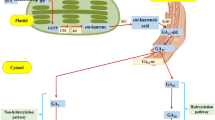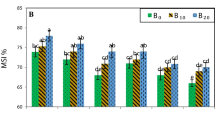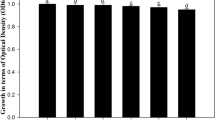Abstract
This study aimed to investigate the effect of plant growth regulators (PGRs) for improving the quantity and quality of rapeseed oil under different irrigation conditions. A 2-year experiment was conducted in a split-plot arrangement based on a randomized complete block design with three replications over 2 years (2015–16 and 2016–17) at Safiabad Agricultural and Natural Resources Research and Education Center. Main plots consisted of three irrigation regimes (optimal irrigation, restricted irrigation from flowering, and restricted irrigation from silique setting) and subplots included 10 levels of foliar application of PGRs (100, 200, and 300 mg l−1 ascorbic acid; 100, 200, and 300 µM salicylic acid; 10, 20, and 30% [w/v] methanol; and foliar application of distilled water as control). The studied cultivar was Hyola401. Restricted irrigation from flowering and silique-setting stages led to decreases in rapeseed seed yield by 38 and 15% as compared with the full irrigation regime, respectively. The interaction of irrigation regime × foliar application showed that spraying ascorbic acid (300 mg l−1) maximized the seed yield under optimal irrigation (4493.33 kg ha−1) and restricted irrigation from the silique-setting stage (3884.72 kg ha−1). Under restricted irrigation from the flowering stage, foliar spray of methanol (30%) produced the highest seed yield (2667.77 kg ha−1). Restricted irrigation from flowering and silique stages resulted in a decrease in oil content by 9.28 and 5.83%, respectively. Overall, foliar application of ascorbic acid, salicylic acid, and methanol improved the seed yield and oil quality of rapeseed under optimal water supply and drought-stress regimes.




Similar content being viewed by others
References
Abbasian A, Mirshekari B, Safarzade Vishekaei MN, Rashidi V, Aminpanah H (2016) Effects of the foliar application of methanol on the yield and growth of rice (Oryza sativa cv. Shiroudi). Cienc Investig Agrar 43(1):17–24. https://doi.org/10.4067/S0718-16202016000100002
Aftab T, Khan MMA, Da Silva JAT, Idrees M, Naeem M (2011) Role of salicylic acid in promoting salt stress tolerance and enhanced artemisinin production in Artemisia annua L. J Plant Growth Regul 30(4):425–435. https://doi.org/10.1007/s00344-011-9205-0
Ahmad I, Ahmad TKA, Basra SM, Hasnain Z, Ali A (2012) Effect of seed priming with ascorbic acid, salicylic acid and hydrogen peroxide on emergence, vigor and antioxidant activities of maize. Afr J Biotechnol 11(5):1127–1137. https://doi.org/10.5897/AJB11.2266
Ali-Shahhat IM, Ghazal GM, Mohamed GS (2014) Effect of ascorbic acid and niacin on protein, oil fatty acids and antibacterial activity of Lupinus termis seeds. Int J Pharmacogn Phytochem Res 15(6):866–873
Aliyari Rad S, Dehghanian Z, Asgari Lajayer B, Nobaharan K, Astatkie T (2021) Mitochondrial respiration and energy production under some abiotic stresses. J Plant Growth Regul 41:3285–3299. https://doi.org/10.1007/s00344-021-10512-1
Amiri-Darban N, Nourmohammadi G, Rad AHS, Mirhadi SMJ, Heravan IM (2020) Potassium sulfate and ammonium sulfate affect quality and quantity of camelina oil grown with different irrigation regimes. Ind Crops Prod 148:112308. https://doi.org/10.1016/j.indcrop.2020.112308
Athar HR, Khan A, Ashraf M (2008) Exogenously applied ascorbic acid alleviates salt induced oxidative stress in wheat. Environ Exp Bot 63:224–231. https://doi.org/10.1016/j.envexpbot.2007.10.018
Azadmard-Damirchi S, Dutta PC (2006) Novel solid-phase extraction method to separate 4‑desmethyl-, 4‑monomethyl-, and 4, 4′-dimethylsterols in vegetable oils. J Chromatogr A 1108(2):183–187. https://doi.org/10.1016/j.chroma.2006.01.015
Azadmard-Damirchi SA, Savage GP, Dutta PC (2005) Sterol fractions in hazelnut and virgin olive oils and 4,4′-dimethylstrols as possible markers for detection of adulteration of virgin olive oil. J Am Oil Chem Soc 82:717–725. https://doi.org/10.1007/s11746-005-1133-y
Barth DE, Tullio M, Conklin PL (2006) The role of ascorbic acid in the control of flowering time and the onset of senescence. J Exp Bot 57:1657–1665. https://doi.org/10.1093/jxb/erj198
Bybordi A (2012) Effect of ascorbic acid and silicium on photosynthesis, antioxidant enzyme activity, and fatty acid contents in canola exposure to salt stress. J Integr Agric 11(10):1610–1620. https://doi.org/10.1016/S2095-3119(12)60164-6
Dewez D, Dautremepuits C, Jeandet P, Vernet G, Popovic R (2003) Effects of methanol on photosynthetic processes and growth of Lemna gibba. Photochem Photobiol 78(4):420–424. https://doi.org/10.1562/0031-8655(2003)0780420EOMOPP2.0.CO2
Dolatabadian A, Modarresi Sanavy SAM, Asilan KS (2010) Effect of ascorbic acid foliar application on yield, yield component and several morphological traits of grain corn under water deficit stress conditions. Not Sci Biol 2:45–50. https://doi.org/10.15835/nsb234717
Ebrahimian E, Bybordi A (2012) Effect of salinity, salicylic acid, silicium and ascorbic acid on lipid peroxidation, antioxidant enzyme activity and fatty acid content of sunflower. Afr J Agric Res 7(25):3685–3694. https://doi.org/10.5897/AJAR11.799
El-Sabagh A, Abdelaal KA, Barutcular C (2017) Impact of antioxidants supplementation on growth, yield and quality traits of canola (Brassica napus L.) under irrigation intervals in North Nile Delta of Egypt. J Exp Biol 5(2):163–172. https://doi.org/10.18006/2017.5(2).163.172
Elferjani R, Soolanayakanahally R (2018) Canola responses to drought, heat, and combined stress: shared and specific effects on carbon assimilation, seed yield, and oil composition. Front Plant Sci 9:1224. https://doi.org/10.3389/fpls.2018.01224
Emam MM, El-Sweify AH, Helal NM (2011) Efficiencies of some vitamins in improving yield and quality of flax plant. Afr J Agric Res 6(18):4362–4369. https://doi.org/10.5897/AJAR11.1104
Enjalbert JN, Zheng S, Johnson JJ, Mullen JL, Byrne PF, McKay JK (2013) Brassicaceae germplasm diversity for agronomic and seed quality traits under drought stress. Ind Crops Prod 47:176–185. https://doi.org/10.1016/j.indcrop.2013.02.037
Estaji A, Niknam F (2020) Foliar salicylic acid spraying effect’on growth, seed oil content, and physiology of drought-stressed Silybum marianum L. plant. Agric Water Manag 234:106116. https://doi.org/10.1016/j.agwat.2020.106116
Eyni-Nargeseh H, Shirani Rad AH, Shiranirad S (2022) Does potassium silicate improve physiological and agronomic traits and oil compositions of rapeseed genotypes under well-watered and water-limited conditions? Gesunde Pflanz 74:801–816. https://doi.org/10.1007/s10343-022-00652-z
FAO (2020) World food and agriculture-statistical yearbook 2020 https://doi.org/10.4060/cb1329en
Farahani S, Majidi Heravan E, Shirani Rad AH, Noormohammadi G (2019) Effect of potassium sulfate on quantitative and qualitative characteristics of canola cultivars upon late-season drought stress conditions. J Plant Nutr 42(13):1543–1555. https://doi.org/10.1080/01904167.2019.1628987
Farhangi-Abriz S, Ghassemi-Golezani K (2016) Improving amino acid composition of soybean under salt stress by salicylic acid and jasmonic acid. J Appl Bot Food Qual 89:243–248. https://doi.org/10.5073/JABFQ.2016.089.031
Fariduddin Q, Hayat S, Ahmad A (2003) Salicylic acid influences net photosynthetic rate, carboxylation efficiency, nitrate reductase activity, and seed yield in Brassica juncea. Photosynthetica 41:281–284. https://doi.org/10.1023/B:PHOT.0000011962.05991.6c
Feizabadi A, Noormohammadi G, Fatehi F (2021) Changes in growth, physiology, and fatty acid profile of rapeseed cultivars treated with vermicompost under drought stress. J Soil Sci Plant Nutr 21(1):200–208. https://doi.org/10.1007/s42729-020-00353-4
Flagella Z, Giuliani MM, Rotunno T, Di Caterina R, De Caro A (2004) Effect of saline water on oil yield and quality of a high oleic sunflower (Helianthus annuus L.) hybrid. Eur J Agron 21(2):267–272. https://doi.org/10.1016/j.eja.2003.09.001
Ganj-Abadi F, Rad AHS, Sani B, Mozafari H (2021) Grain yield and qualitative of rapeseed genotypes change in response to exogenous application of salicylic acid and planting density. Gesunde Pflanz 73:335–344. https://doi.org/10.1007/s10343-021-00558-2
Ghassemi-Golezani K, Farhangi-Abriz S, Bandehagh A (2018) Salicylic acid and jasmonic acid alter physiological performance, assimilate mobilization and seed filling of soybean under salt stress. Acta Agric Slov 111:597–607. https://doi.org/10.14720/aas.2018.111.3.08
Ghassemi-Golezani K, Bilasvar HM, Nassab ADM (2019) Improving rapeseed (Brassica napus L.) plant performance by exogenous salicylic acid and putrescine under gradual water deficit. Acta Physiol Plant 41(12):1–8. https://doi.org/10.1007/s11738-019-2986-7
Gout E, Aubert S, Bligny R, Rébeillé F, Nonomura AR, Benson AA, Douce R (2000) Metabolism of methanol in plant cells. Carbon-13 nuclear magnetic resonance studies. Plant Physiol 123(1):287–296. https://doi.org/10.1104/pp.123.1.287
Grown BAOSP (2012) Physiological role of salicylic acid in improving performance, yield and some biochemical aspects of sunflower plant grown under newly reclaimed sandy soil. Aust J Basic Appl Sci 6(4):82–89
Hayat Q, Hayat S, Irfan M, Ahmad A (2010) Effect of exogenous salicylic acid under changing environment: a review. Environ Exp Bot 68(1):14–25. https://doi.org/10.1016/j.envexpbot.2009.08.005
Heshmat K, Asgari Lajayer B, Shakiba MR, Astatkie T (2021) Assessment of physiological traits of common bean cultivars in response to water stress and molybdenum levels. J Plant Nutr 44(3):366–372. https://doi.org/10.1080/01904167.2020.1822395
Ijaz M, Sher A, Sattar A, Shahid M, Nawaz A, Ul-Allah S, Saqib M (2019) Response of canola (Brassica napus L.) to exogenous application of nitrogen, salicylic acid and gibberellic acid under an arid climate. Soil Environ 38(1):90–96. https://doi.org/10.25252/SE/19/71619
ISO 5511 (1992) Oilseeds—determination of oil content—method using continuous-wave low-resolution nuclear magnetic resonance spectrometry (rapid method)
Jamshidi Zinab A, Hasanloo T, Naji AM, Delangiz N, Farhangi-Abriz S, Asgari Lajayer B, Farooq M (2022) Physiological and biochemical evaluation of commercial oilseed rape (brassica Napus L.) cultivars under drought stress. Gesunde Pflanz. https://doi.org/10.1007/s10343-022-00755-7
Johnston AM, Tanaka DL, Miller PR, Brandt SA, Nielsen DC, Lafond GP, Riveland NR (2002) Oilseed crops for semiarid cropping systems in the northern Great Plains. Agron J 94(2):231–240
Kalantar Ahmadi SA, Ebadi A, Daneshian J, Jahanbakhsh S, Siadat SA, Tavakoli H (2015a) Effects of irrigation deficit and application of some growth regulators on defense mechanisms of canola. Not Bot Horti Agrobo 43(1):124–130. https://doi.org/10.15835/nbha4319668
Kalantar ahmadi SA, Ebadi A, Jahanbakhsh S, Daneshian J, Siadat SA (2015b) Changes in enzymatic and nonenzymatic antioxidant defense mechanisms of canola seedlings at different drought stress and nitrogen levels. Turk J Agric For 39(5):601–612. https://doi.org/10.3906/tar-1404-140
Kalantar Ahmadi SA, Ebadi A, Daneshian J, Siadat SA, Jahanbakhsh S (2016) Effect of drought stress and foliar application of growth regulators on photosynthetic pigments and seed yield of rapeseed (Brassica napus L. cv. Hyola 401). Iran J Crop Sci 18(3):196–217
Kalantarahmadi SA, Daneshian J (2023) Improving of Canola (Brassica napus L.) yield and oil quality by foliar application of micro-nutrients under high-temperature stress. J Soil Sci Plant Nutr 23:351–367. https://doi.org/10.1007/s42729-022-01016-2
Kamal MA, Saleem MF, Wahid MA, Shakeel A (2017) Effects of ascorbic acid on membrane stability and yield of heat stressed BT cotton. J Anim Plant Sci 27(1):192–199
Khan W, Prithiviraj B, Smith DL (2003) Photosynthetic responses of corn and soybean to foliar application of salicylates. J Plant Physiol 160(5):485–492. https://doi.org/10.1078/0176-1617-00865
Khodabin G, Tahmasebi-Sarvestani Z, Rad AHS, Modarres-Sanavy SAM (2020) Effect of drought stress on certain morphological and physiological characteristics of a resistant and a sensitive canola cultivar. Chem Biodivers 17(2):1–13. https://doi.org/10.1002/cbdv.201900399
Liu J, Hua W, Yang H, Guo T, Sun X, Wang X, Wang H (2014) Effects of specific organs on seed oil accumulation in Brassica napus L. Plant Sci 227:60–68. https://doi.org/10.1016/j.plantsci.2014.06.017
Mabudi Bilasvar H, Ghassemi-Golezani K, Mohammadi Nassab AD (2022) Seed development, oil accumulation and fatty acid composition of drought stressed rapeseed plants affected by salicylic acid and putrescine. Gesunde Pflanz 74:333–345. https://doi.org/10.1007/s10343-021-00612-z
Madhaiyan M, Poonguzhali S, Sundaram SP, Sa T (2006) A new insight into foliar applied methanol influencing phylloplane methylotrophic dynamics and growth promotion of cotton (Gossypium hirsutum L.) and sugarcane (Saccharum officinarum L.). Environ Exp Bot 57(1–2):168–176. https://doi.org/10.1016/j.envexpbot.2005.05.010
Makkar HPS, Siddhuraju P, Becker K (2007) Plant secondary metabolites. Humana, Totowa https://doi.org/10.1007/978-81-322-2401-3_11
Mirakhori M, Paknejad F, Moradi F, Ardakani M, Zahedi H, Nazeri P (2009) Effect of drought stress and methanol on yield and yield components of soybean max (L 17). Am J Biochem Biotechnol 5(4):162–169
Mohammad T, Ali A, Nadeem MA, Tanveer A, Sabir QM (2007) Performance of canola (Brassica napus) and Indian mustard (B. juncea) to soil water deficits: yield and yield components. Field Crop Res 42:1–13
Mohammadi Alagoz S, Zahra N, Hajiaghaei Kamrani M, Asgari Lajayer B, Nobaharan K, Astatkie T, Farooq M (2022) Role of root hydraulics in plant drought tolerance. J Plant Growth Regul. https://doi.org/10.1007/s00344-022-10807-x
Mokhtassi-Bidgoli A, AghaAlikhani M, Eyni-Nargeseh H (2022) Effects of nitrogen and water on nutrient uptake, oil productivity, and composition of descurainia sophia. J Soil Sci Plant Nutr 22:59–70. https://doi.org/10.1007/s42729-021-00633-7
Moran JF, Becana M, Iturbe-Ormaetxe I, Frechilla S, Klucas RV, Aparicio-Tejo P (1994) Drought induces oxidative stress in pea plants. Planta 194(3):346–352. https://doi.org/10.1007/BF00197534
Munir N, Naz S, Aslam F, Shahzadi K, Javad S (2013) Effect of various levels of ascorbic acid pretreatment on alleviation of salt stress in salt sensitive sugarcane genotype SPF-213. J Agric Res 51(3):267–277
Nemecek-Marshall M, MacDonald RC, Franzen JJ, Wojciechowski CL, Fall R (1995) Methanol emission from leaves (enzymatic detection of gas-phase methanol and relation of methanol fluxes to stomatal conductance and leaf development). Plant Physiol 108(4):1359–1368. https://doi.org/10.1104/pp.108.4.1359
Nonomura AM, Benson AA (1992) The path of carbon in photosynthesis: improved crop yields with methanol. Proc Natl Acad Sci USA 89(20):9794–9798. https://doi.org/10.1073/pnas.89.20.9794
Noreen S, Ashraf M (2010) Modulation of salt (NaCl)-induced effects on oil composition and fatty acid profile of sunflower (Helianthus annuus L.) by exogenous application of salicylic acid. J Sci Food Agric 90(15):2608–2616. https://doi.org/10.1002/jsfa.4129
Paknejad F, Mirakhori M, Al-Ahmadi MJ, Tookalo MR, Pazoki AR, Nazeri P (2009) Physiological response of soybean (Glycine max) to foliar application of methanol under different soil moistures. Am J Agric Biol Sci 4(4):311–318
Pastori GM, Kiddle G, Antoniw J, Bernard S, Veljovic-Jovanovic S, Verrier PJ, Foyer CH (2003) Leaf vitamin C contents modulate plant defense transcripts and regulate genes that control development through hormone signaling. Plant Cell 15(4):939–951. https://doi.org/10.1105/tpc.010538
Pignocchi C, Foyer CH (2003) Apoplastic ascorbate metabolism and its role in the regulation of cell signalling. Curr Opin Plant Biol 6(4):379–389. https://doi.org/10.1016/S1369-5266(03)00069-4
Pritchard FM, Eagles HA, Norton RM, Salisbury PA, Nicolas M (2000) Environmental effects on seed composition of Victorian canola. Aust J Exp Agric 40(5):679–685. https://doi.org/10.1071/EA99146
Ramirez I, Dorta F, Espinoza V, Jiménez E, Mercado A, Peña-Cortés H (2006) Effects of foliar and root applications of methanol on the growth of Arabidopsis, tobacco, and tomato plants. J Plant Growth Regul 25(1):30–44. https://doi.org/10.1007/s00344-005-0027-9
Razmi N, Ebadi A, Daneshian J, Jahanbakhsh S (2017) Salicylic acid induced changes on antioxidant capacity, pigments and grain yield of soybean genotypes in water deficit condition. J Plant Interact 12(1):457–464. https://doi.org/10.1080/17429145.2017.1392623
Rehman A (2018) Response of canola to moisture stress and foliar application of stress tolerance inducing chemicals (Doctoral dissertation, The University of Agriculture, Peshawar). http://142.54.178.187:9060/xmlui/handle/123456789/2232
Safavifard NS, Abad HHS, Rad AS, Heravan EM, Daneshian J (2018) Effect of drought stress on qualitative characteristics of canola cultivars in winter cultivation. Ind Crops Prod 114:87–92. https://doi.org/10.1016/j.indcrop.2018.01.082
Sakr MT, Arafa AA (2009) Effect of some antioxidants on canola plants grown under soil salt stress condition. Pak J Biol Sci 12(7):582–588
Seleiman MF, Al-Suhaibani N, Ali N, Akmal M, Alotaibi M, Refay Y, Battaglia ML (2021) Drought stress impacts on plants and different approaches to alleviate its adverse effects. Plants 10(2):259. https://doi.org/10.3390/plants10020259
Shafiq S, Akram NA, Ashraf M, Arshad A (2014) Synergistic effects of drought and ascorbic acid on growth, mineral nutrients and oxidative defense system in canola (Brassica napus L.) plants. Acta Physiol Plant 36(6):1539–1553. https://doi.org/10.1007/s11738-014-1530-z
Shahsavari N, Dadrasnia A (2016) Effect of zeolites and zinc on the physiological characteristics of canola under late-season drought stress. Commun Soil Sci Plant Anal 47(18):2077–2087. https://doi.org/10.1080/00103624.2016.1228940
Shiranirad AH, Ganj-Abadi F, Jalili EO, Eyni-Nargeseh H, Safavi Fard N (2021) Zn foliar spray as a management strategy boosts oil qualitative and quantitative traits of spring rapeseed genotypes at winter sowing dates. J Soil Sci Plant Nutr 21:1610–1620. https://doi.org/10.1007/s42729-021-00489-x
Shiranirad S, Eyni-Nargeseh H, Shirani Rad AH, Malmir M (2023) Managing irrigation and sowing date can improve oil content and fatty acid composition of Camelina sativa L. Arch Agron Soil Sci. https://doi.org/10.1080/03650340.2023.2177989
Singh B, Usha K (2003) Salicylic acid induced physiological and biochemical changes in wheat seedlings under water stress. Plant Growth Regul 39(2):137–141. https://doi.org/10.1023/A:1022556103536
Singh AP, Dixit G, Kumar A, Mishra S, Kumar N, Dixit S, Tripathi RD (2017) A protective role for nitric oxide and salicylic acid for arsenite phytotoxicity in rice (Oryza sativa L.). Plant Physiol Biochem 115:163–173. https://doi.org/10.1016/j.plaphy.2017.02.019
Smirnoff N (2011) Vitamin C: the metabolism and functions of ascorbic acid in plants. Adv Bot Res 59:107–177. https://doi.org/10.1016/B978-0-12-385853-5.00003-9
Smirnoff N, Wheeler GL (2000) Ascorbic acid in plants: Biosynthesis and function. Crit Rev Biochem Mol Biol 35(4):291–314. https://doi.org/10.1080/07352680091139231
Sun XP, Yan HL, Kang XY, Ma FW (2013) Growth, gas exchange, and water-use efficiency response of two young apple cultivars to drought stress in two scion-one rootstock grafting system. Photosynthetica 51(3):404–410. https://doi.org/10.1007/s11099-013-0040-3
Ullah F, Bano A, Nosheen A (2012) Effects of plant growth regulators on growth and oil quality of canola (Brassica napus L.) under drought stress. Pak J Bot 44(6):1873–1880
Vojodi L, Hassanpouraghdam MB, Valizadeh Kamran R, Ebrahimzadeh A (2017) Soil cover effects on yield and some physiological characteristics of marigold (Calendula officinalis L.) under methanol foliar application. J Ornam Plants 7(3):163–169
Weber E, Bleiholder H (1990) Explanations of the BBCH decimal codes for the growth stages of maize, rape, faba beans, sunflowers and peas-with illustrations. Gesunde Pflanz 42(9):308–321
Wu L, Chen H, Curtis C, Fu ZQ (2014) Go in for the kill: How plants deploy effector-triggered immunity to combat pathogens. Virulence 5(7):710–721. https://doi.org/10.4161/viru.29755
Yazdi Far S, Moradi P, Yousefi Rad M (2015) Effect of foliar application of methanol and chelated zinc on the quantities and qualities yield of marigold (Calendula officinalis L.). J Appl Environ Biol Sci 4(12):170–176
Zbiec I, Karczmarczyk S, Podsiadło C (2003) Response of some cultivated plants to methanol as compared to supplemental irrigation. EJPAU 6:1–5
Zhang Y, Zhou Y, Zhang D, Tang X, Li Z, Shen C, Xia X (2020) PtrWRKY75 overexpression reduces stomatal aperture and improves drought tolerance by salicylic acid-induced reactive oxygen species accumulation in poplar. Environ Exp Bot 176:104117. https://doi.org/10.1016/j.envexpbot.2020.104117
Zhu J, Cai D, Wang J, Cao J, Wen Y, He J, Zhang S (2021) Physiological and anatomical changes in two rapeseed (Brassica napus L.) genotypes under drought stress conditions. Oil Crop Sci 6(2):97–104. https://doi.org/10.1016/j.ocsci.2021.04.003
Acknowledgements
This research was supported by the Safiabad Agricultural and Natural Resources Research and Education Center.
Funding
This research did not receive any specific grant from funding agencies in the public, commercial, or not-for-profit sectors.
Author information
Authors and Affiliations
Corresponding author
Ethics declarations
Conflict of interest
S.A. Kalantar Ahmadi, and H. Eyni-Nargeseh declare that they have no competing interests.
Rights and permissions
Springer Nature oder sein Lizenzgeber (z.B. eine Gesellschaft oder ein*e andere*r Vertragspartner*in) hält die ausschließlichen Nutzungsrechte an diesem Artikel kraft eines Verlagsvertrags mit dem/den Autor*in(nen) oder anderen Rechteinhaber*in(nen); die Selbstarchivierung der akzeptierten Manuskriptversion dieses Artikels durch Autor*in(nen) unterliegt ausschließlich den Bedingungen dieses Verlagsvertrags und dem geltenden Recht.
About this article
Cite this article
Kalantar Ahmadi, S.A., Eyni-Nargeseh, H. Foliar Application of Growth Regulators Mitigates Harmful Effects of Drought Stress and Improves Seed Yield and Oil Quality of Rapeseed (Brassica napus L.). Gesunde Pflanzen 75, 2449–2462 (2023). https://doi.org/10.1007/s10343-023-00907-3
Received:
Accepted:
Published:
Issue Date:
DOI: https://doi.org/10.1007/s10343-023-00907-3




